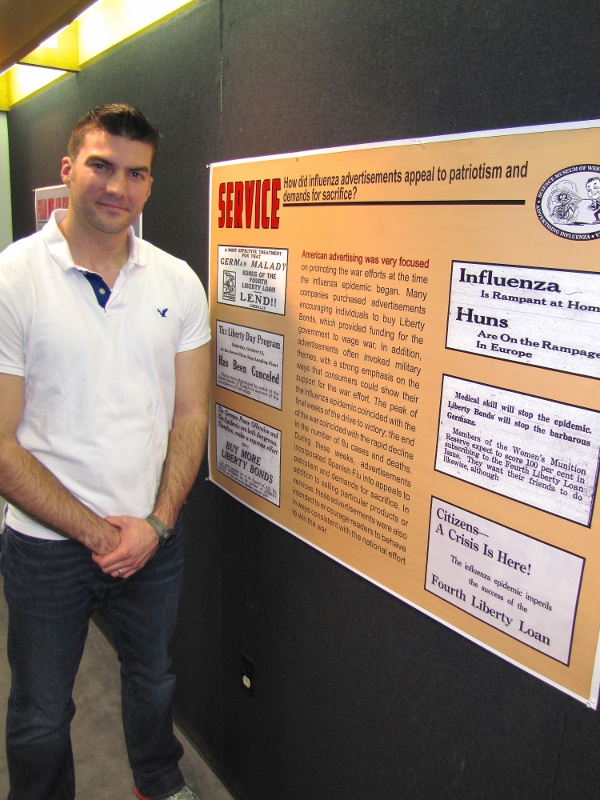
Brooks Tiffany will leave Virginia Tech this month with his name on his diploma—and on a display at the Science Museum of Western Virginia in Roanoke.
Tiffany, age 31, designed posters for an exhibit about companies that cashed in on the 1918 flu pandemic. The 12 posters feature advertisements of that era from newspapers across the nation, including the Roanoke Times, for mouthwashes, tonics, and other products marketed as flu protection.
“I consider myself a bit of a history buff,” Tiffany said. “Being able to combine that with the opportunity to design this exhibit was a dream come true.”
The epidemic, which began at East Coast military bases in September 1918, quickly spread, leading to an estimated 675,000 deaths within months. Roanoke was hit hard. In the epidemic’s first three weeks, 3,031 cases were reported, with at least 50 deaths.
The military connection has special interest to Tiffany, who left Virginia Tech in 2005 for a five-year stint in the U.S. Air Force. He returned in 2010 as an Air Force reservist and will graduate on Friday with a degree in English.
The ad project is an offshoot of research by Tom Ewing, an associate dean in the College of Liberal Arts and Human Sciences and a professor in the Department of History. Ewing is a principal investigator for “An Epidemiology of Information: Data Mining the 1918 Influenza Pandemic,” a winning proposal in the international Digging into Data Challenge, which funds innovative humanities and social science research.
Studying the massive amounts of data collected from newspapers across the country in 1918, Ewing became intrigued with how ads shaped the flow of information at a time of crisis. He collaborated with Jennifer Mooney, a senior instructor in the Department of English, on various aspects of the posters.
Mooney, who was teaching Tiffany in her Designing Documents for Print spring semester course, recognized his talent and recommended him to Ewing.
The three met in May to review more than 100 ads and to discuss color, layout, font and graphics. In creating the posters, Ewing said, “we looked for a balance between text and images.” Some of the ads were taken directly from microfilm and are not touched up. Others have been digitized and look cleaner. They vary in tone from alarmist to reassuring.
Some of the measures are still good advice: “After the day’s work wash face and hands,” reads an ad for Lifebuoy soap. Others, not so much: “Influenza? Keep your bowels in good condition with Rexall Orderlies,” advises an ad for an Arizona drugstore.
With funding from the Digging into Data grant, Ewing offered Tiffany a summer job working on the posters. “We went over options for display, themes, and size of the posters,” Tiffany said. “I made tons of mockups. The first set was somewhere between 30 and 50 posters.”
Settling on 12, Tiffany and Ewing took the posters to the museum in July for review. Titled “Protect Yourself Against Influenza,” the exhibit opened in Roanoke Nov. 3 and continues through January.
“It was the perfect summer job,” Tiffany said. “Besides getting paid, getting the experience was invaluable.”
The project led to another benefit for Tiffany. He was honored by the College of Liberal Arts and Human Sciences as its Undergraduate Research Scholar of the Month for November 2013.

